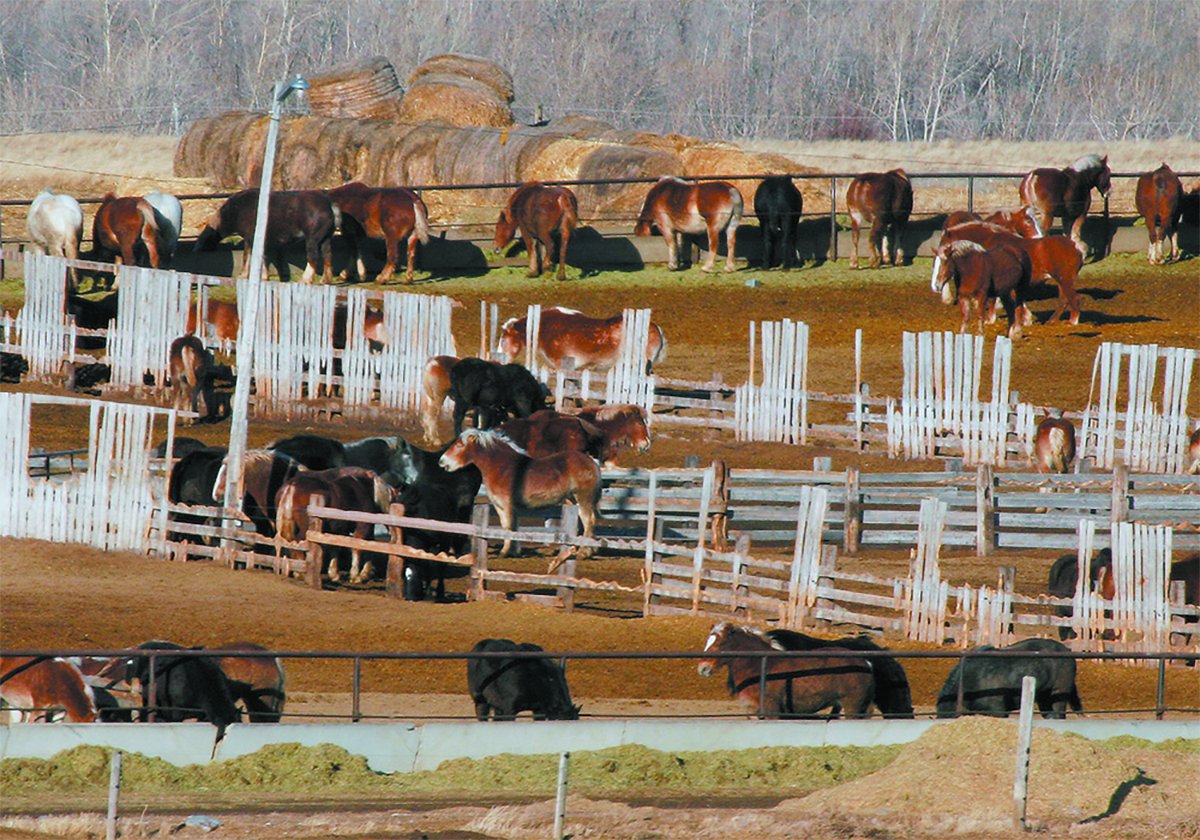ETZIKOM, Alta. – It is a few minutes before closing time on a Saturday and customers are still lined up at the counter of Mr. Beef, an organic butcher shop in southeastern Calgary.
It is one of the few city outlets offering fresh red meat and chicken from Alberta organically certified farms.
Becoming a shop owner has been a 14 year journey for Etzikom farmer Bernie Ehnes, one of four partners in the store.
Farming with his twin brother Brian, their mixed farm was certified organic in 1992.
Read Also

Canada’s slaughter horse industry lacks transparency
The lack of clear reporting and public access to data keeps the industry largely hidden, leaving questions about humane treatment and traceability unanswered.
Located in the drylands of southeastern Alberta, the farm was homesteaded by their grandfather around 1911.
“It was farmed organically originally and it is farmed organically again,” said Bernie.
They changed farming directions when they decided to seed mustard into newly broken land. A mustard contractor suggested they could make more money offering an organic product grown on virgin soil. They eventually converted their entire grain operation in the early 1990s and switched their cow herd over to organic production in 1996.
As early adopters of the concept, they found the transition was not difficult since most of their practices were already in line with organic principles. Over time they have learned more about their land and what grows successfully.
“It’s mostly talking to other farmers, hearing them out and seeing what they are doing, and experimenting,” said Brian.
The major challenge was handling paperwork.
All field information is entered into a special computer program for precise records on every strip of land.
“It has made us more aware of some of the changes we have done and we can go back and compare,” said Bernie.
In order to sell any products, they must belong to an organic certification body. They joined Global Organic Alliance Biological Producers based in Ohio. It provides a wide range of internationally accepted standards.
Organic inspectors visit every year and check seeding dates, inputs and field maps, as well as monitor the 7.5 metre boundary strips that separate them from neighbouring conventional farms.
All trucks hauling their grain must be cleaned and they are fussy about residues. If a truck is not spotless, they do not load.
Insect and gopher control can be as troublesome as on conventional farms. In 2001, the area suffered extreme drought and grasshoppers ate whatever crop survived.
“I lost 45 acres to grasshoppers but even the guys spraying chemicals were having difficulty,” said Bernie.
They can spray organic sugars on the plants for hopper control and some people plant repellent-type crops on the boundaries of fields.
Sometimes nature takes its course. In the case of gophers, they noticed badgers moved in and the problem ended. In the early years they noticed a spreading Canada thistle patch. A weevil moved in and removed the weed naturally.
The two men never stand still.
They decided to build their own seed cleaning plant rather than ship grain to an American certified organic plant 100 kilometres away. They clean grain for conventional farms and flush the plant between jobs.
Finding organic seed in an era of genetic modification has not been a problem so far. They became pedigreed seed growers and have a network of contacts to find new approved varieties.
“We stay with varieties that work good for us and we have to do our research. I have to get in touch with the breeders to ensure it is not a genetically altered crop,” said Bernie.
Besides becoming more diligent record keepers, they learned how to sell.
When they started, there were few organic brokers or mills. The first few years most of their wheat and barley went to the Canadian Wheat Board without differentiation.
Once they established their names and reputations as growers, buyers started calling them. However, wheat and barley sales must still go through the board’s buyback program and they find those rules frustrating.
“They’re not doing the paperwork or the searching trying to find a market,” said Brian.
Livestock works well in an organic system. Until a few years ago they kept a large cow-calf operation but drought and dried-up dugouts forced a sellout. Now they buy about 70 feeder calves at a time and finish them for their butcher trade.
In this system the mother cows receive organic feed in the last trimester of pregnancy and then the calf is considered organic.
The steers are slaughtered at two local certified organic abattoirs. The sides go to the Calgary shop where the meat is aged 21-28 days.
Concern about BSE has driven up consumer demand for organically produced meat.
The meat sales earn a 20-25 percent premium over traditional beef sales. They also found a market for the livers, hearts and tongue.
“We have a guy who comes in every week for organic liver,” said Bernie.
They have a lot numbering system for each animal, so they can provide complete traceback from every cut of meat.
Some of the profit has diminished in the last year because they have to pay the abattoir a disposal fee for specified risk materials and other non-edible products. The hides belong to the abattoir.
The Ehneses are often asked how to get into the organic business but when other farmers learn the amount of research and commitment, many are not willing to try it. For instance, the meat shop involved two years of research before they even bought the store.
“For somebody else to go out there and do it, it could be a very big challenge,” said Bernie.

















